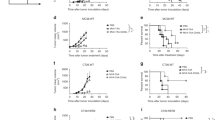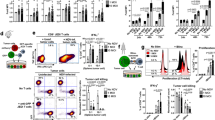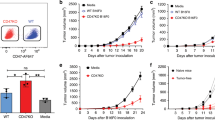Abstract
We previously showed that genetic immunization of C57BL/6 mice with recombinant adenovirus encoding human TRP2 (Ad-hTRP2) was able to circumvent tolerance and induce cellular and humoral immune responses to murine TRP2 associated with protection against metastatic growth of B16 melanoma. In the present study we compared delivery of Ad-hTRP2 with cultured dendritic cells (DC) and direct injections of Ad-hTRP2. We show that application of Ad-hTRP2 with cultured DC enhanced protective immunity to B16 melanoma cells. Most importantly, delivery of recombinant adenovirus with DC alters the character of the immune response resulting in preferential stimulation of strong cellular immunity in the absence of significant humoral immunity to the encoded antigen. Adoptive transfer of lymphocytes from mice immunized with Ad-hTRP2-transduced DC confirmed that cellular components of the immune response were responsible for rejection of B16 melanoma. The protective efficacy of Ad-hTRP2-transduced DC clearly depended on the presence of CD4+ T helper cells. Furthermore, AD-hTRP2-transduced DC, but not direct injection of Ad-hTRP2, were effective in the presence of neutralizing anti-adenoviral antibodies. These preclinical studies demonstrate the superiority of melanoma vaccines consisting of cultured DC transduced with recombinant adenoviruses encoding melanoma antigens.
This is a preview of subscription content, access via your institution
Access options
Subscribe to this journal
Receive 12 print issues and online access
$259.00 per year
only $21.58 per issue
Buy this article
- Purchase on Springer Link
- Instant access to full article PDF
Prices may be subject to local taxes which are calculated during checkout






Similar content being viewed by others
References
Ulmer JB, Sadoff JC, Liu MA . DNA vaccines Curr Opin Immunol 1996 8: 531–536
Restifo NP . The new vaccines: building viruses that elicit antitumor immunity Curr Opin Immunol 1996 8: 658–663
Tüting T, Storkus WJ, Falo LD . DNA immunization targeting the skin: molecular control of adaptive immunity J Invest Dermatol 1998 111: 183–188
Warnier G et al. Induction of a cytolytic T-cell response in mice with a recombinant adenovirus coding for tumor antigen P815A Int J Cancer 1996 7: 303–310
Chen PW et al. Therapeutic antitumor response after immunization with a recombinant adenovirus encoding a model tumor-associated antigen J Immunol 1996 156: 224–231
Condon C et al. DNA-based immunization by in vivo transfection of dendritic cells Nat Med 1996 2: 1122–1128
Tüting T et al. Induction of tumor antigen-specific immunity using DNA immunization in mice Cancer Gene Ther 1999 6: 73–80
Boon T et al. Tumor antigens recognized by T lymphocytes Annu Rev Immunol 1994 12: 337–365
Rosenberg SA . Cancer vaccines based on the identification of genes encoding cancer regression antigens Immunol Today 1997 18: 175–182
Wölfel T et al. Two tyrosinase nonapeptides recognized on HLA-A2 melanomas by autologous cytolytic T lymphocytes Eur J Immunol 1994 24: 759–764
Topalian SL et al. Melanoma-specific CD4+ T cells recognize nonmutated HLA-DR-restricted tyrosinase epitopes J Exp Med 1996 183: 1965–1971
Wang RF et al. Identification of TRP-2 as a human tumor antigen recognized by cytotoxic T lymphocytes J Exp Med 1996 184: 2207–2216
Parkhurst MR et al. Identification of a shared HLA-A *0201-restricted T-cell epitope from the melanoma antigen tyrosinase-related protein 2 (TRP2) Cancer Res 1998 58: 4895–4901
Weber LW et al. Tumor immunity and autoimmunity induced by immunization with homologous DNA J Clin Invest 1998 102: 1258–1264
Hirschowitz EA et al. Adenovirus-mediated expression of melanoma antigen gp75 as immunotherapy for metastatic melanoma Gene Therapy 1998 5: 975–983
Overwijk WW et al. Vaccination with a recombinant vaccinia virus encoding a ‘self’ antigen induces autoimmune vitiligo and tumor cell destruction in mice: requirement for CD4+ T lymphocytes Proc Natl Acad Sci USA 1999 96: 2982–2987
Bowne WB et al. Coupling and uncoupling of tumor immunity and autoimmunity J Exp Med 1999 190: 1717–1722
Steitz J et al. Genetic immunization with human tyrosinase-related protein 2: implications for the immunotherapy of melanoma Int J Cancer 2000 86: 89–94
Bronte V et al. Genetic vaccination with ‘self’ tyrosinase-related protein 2 causes melanoma eradication but not vitiligo Cancer Res 2000 60: 253–258
Colella TA et al. Self-tolerance to the murine homologue of a tyrosinase-derived melanoma antigen: implications for tumor immunotherapy J Exp Med 2000 191: 1221–1231
Bloom MB et al. Identification of tyrosinase-related protein 2 as a tumor rejection antigen for the B16 melanoma J Exp Med 1997 185: 453–459
Juillard V et al. Long-term humoral and cellular immunity induced by a single immunization with replication-defective adenovirus recombinant vector Eur J Immunol 1995 25: 3467–3472
Brossart P et al. Virus-mediated delivery of antigenic epitopes into dendritic cells as a means to induce CTL J Immunol 1997 158: 3270–3276
Wan Y et al. Murine dendritic cells transduced with an adenoviral vector expressing a defined tumor antigen can overcome anti-adenovirus neutralizing immunity and induce effective tumor regression Int J Oncol 1999 14: 771–776
Bronte V et al. Antigen expression by dendritic cells correlates with the therapeutic effectiveness of a model recombinant poxvirus tumor vaccine Proc Natl Acad Sci USA 1997 94: 3183–3188
Porgador A et al. Predominant role for directly transfected dendritic cells in antigen presentation to CD8+ T cells after gene gun immunization J Exp Med 1998 188: 1075–1082
Banchereau J, Steinman RM . Dendritic cells and the control of immunity Nature 1998 392: 245–252
Tüting T, DeLeo AB, Lotze MT, Storkus WJ . Genetically modified bone marrow-derived dendritic cells expressing tumor-associated viral or ‘self’ antigens induce antitumor immunity in vivo Eur J Immunol 1997 27: 2702–2707
Lutz MB et al. An advanced culture method for generating large quantities of highly pure dendritic cells from mouse bone marrow J Immunol Methods 1999 223: 77–92
Labeur MS et al. Generation of tumor immunity by bone marrow-derived dendritic cells correlates with dendritic cell maturation stage J Immunol 1999 162: 168–175
Kaplan JM et al. Induction of antitumor immunity with dendritic cells transduced with adenovirus vector-encoding endogenous tumor-associated antigens J Immunol 1999 63: 699–707
Tüting T et al. Dendritic cell-based genetic immunization in mice with a recombinant adenovirus encoding murine TRP2 induces effective anti-melanoma immunity J Gene Med 1999 1: 400–406
Gambotto A et al. Immunogenicity of enhanced green fluorescent protein (EGFP) in BALB/c mice: identification of an H2-Kd-restricted CTL epitope Gene Therapy 2000 7: 2036–2040
Wang KC, Berczi I, Sehon AH . Effector and enhancing lymphoid cells in plasmacytoma-bearing mice. I. Methodological studies on the Winn assay Int J Cancer 1980 25: 487–492
Ludewig B et al. Immunotherapy with dendritic cells directed against tumor antigens shared with normal host cells results in severe autoimmune disease J Exp Med 2000 191: 795–804
Gong J et al. Reversal of tolerance to human MUC1 antigen in MUC1 transgenic mice immunized with fusions of dendritic and carcinoma cells Proc Natl Acad Sci USA 1998 95: 6279–6283
Wan Y et al. Genetically modified dendritic cells prime autoreactive T cells through a pathway independent of CD40L and interleukin 12: implications for cancer vaccines Cancer Res 2000 60: 3247–3253
Zinkernagel RM et al. Antigen localisation regulates immune responses in a dose- and time-dependent fashion: a geographical view of immune reactivity Immunol Rev 1997 156: 199–209
Wan Y et al. Dendritic cells transduced with an adenoviral vector encoding a model tumor-associated antigen for tumor vaccination Hum Gene Ther 1997 8: 1355–1363
Ludewig B et al. Induction of optimal anti-viral neutralizing B cell responses by dendritic cells requires transport and release of virus particles in secondary lymphoid organs Eur J Immunol 2000 30: 185–196
Timares L, Takashima A, Johnston SA . Quantitative analysis of the immunopotency of genetically transfected dendritic cells Proc Natl Acad Sci USA 1998 95: 13147–13152
Zeh HJ et al. High avidity CTLs for two self-antigens demonstrate superior in vitro and in vivo antitumor efficacy J Immunol 1999 162: 989–994
Ossendorp F et al. Specific T helper cell requirement for optimal induction of cytotoxic T lymphocytes against major histocompatibility complex class II negative tumors J Exp Med 1998 187: 693–702
Ridge JP, DiRosa F, Matzinger P . A conditioned dendritic cell can be a temporal bridge between a CD4+ T-helper and T-killer cell Nature 1998 393: 474–477
Schnell S, Young JW, Houghton AN, Sadelain M . Retrovirally transduced mouse dendritic cells require CD4+ T cell help to elicit antitumor immunity: implications for the clinical use of dendritic cells J Immunol 2000 164: 1243–1250
De Veerman M et al. Retrovirally transduced bone marrow-derived dendritic cells require CD4+ T cell help to elicit protective and therapeutic antitumor immunity J Immunol 1999 162: 144–151
Hung K et al. The central role of CD4+ T cells in the antitumor immune response J Exp Med 1998 188: 2357–2368
Mumberg D et al. CD4+ T cells eliminate MHC class II-negative cancer cells in vivo by indirect effects of IFN-gamma Proc Natl Acad Sci USA 1999 96: 8633–8638
Qin Z, Blankenstein T . CD4+ T cell-mediated tumor rejection involves inhibition of angiogenesis that is dependent on IFN gamma receptor expression by nonhematopoietic cells Immunity 2000 12: 677–686
Irvine KR et al. Enhancing efficacy of recombinant anticancer vaccines with prime/boost regimens that use two different vectors J Natl Cancer Inst 1997 90: 1894–1899
Siemens DR et al. Restoration of the ability to generate CTL in mice immune to adenovirus by delivery of virus in a collagen-based matrx J Immunol 2001 166: 731–735
Acknowledgements
This work was supported by the Deutsche Forschungsgemeinschaft (SFB432, project A12). We thank Mrs Gärtner and Mrs Alt for excellent technical assistance. We also thank Dr von Stebut and Dr Steinbrink for critical reading of the manuscript.
Author information
Authors and Affiliations
Rights and permissions
About this article
Cite this article
Steitz, J., Brück, J., Knop, J. et al. Adenovirus-transduced dendritic cells stimulate cellular immunity to melanoma via a CD4+ T cell-dependent mechanism. Gene Ther 8, 1255–1263 (2001). https://doi.org/10.1038/sj.gt.3301521
Received:
Accepted:
Published:
Issue Date:
DOI: https://doi.org/10.1038/sj.gt.3301521
Keywords
This article is cited by
-
Comparison of immune response generated against Japanese encephalitis virus envelope protein expressed by DNA vaccines under macrophage associated versus ubiquitous expression promoters
Virology Journal (2011)
-
Anti-angiogenesis therapy based on the bone marrow-derived stromal cells genetically engineered to express sFlt-1 in mouse tumor model
BMC Cancer (2008)
-
Vaccination Against Hepatitis C Virus With Dendritic Cells Transduced With an Adenovirus Encoding NS3 Protein
Molecular Therapy (2008)
-
Comparison of recombinant adenovirus and synthetic peptide for DC-based melanoma vaccination
Cancer Gene Therapy (2006)
-
Combinational adenovirus-mediated gene therapy and dendritic cell vaccine in combating well-established tumors
Cell Research (2006)



